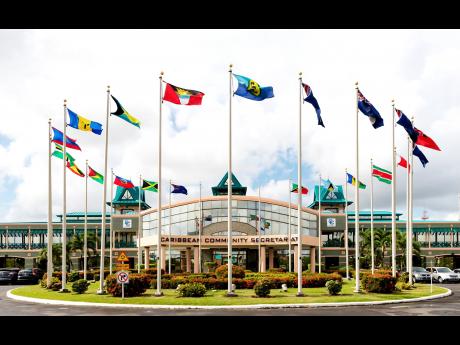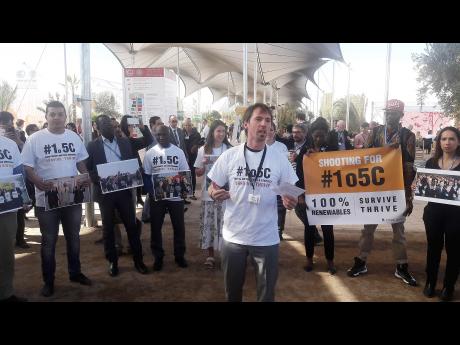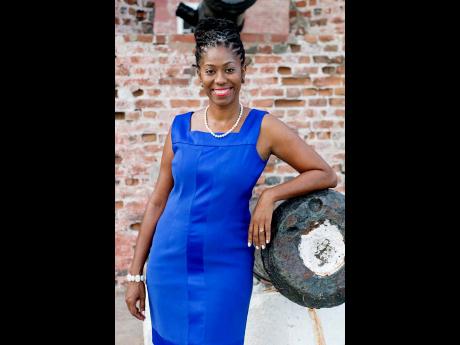Earth Today | 'Caribbean should hit reset on climate advocacy’
CARIBBEAN Community (CARICOM) countries are being urged to take a serious relook at their advocacy efforts ahead of the global climate talks in Poland next month, and in the wake of the approved summary for policy-makers (SPM) of the Inter-governmental Panel on Climate Change Special Report on global warming of 1.5 degrees Celsius.
"I believe it is fair to say that we have lost a considerable amount of momentum in our climate advocacy campaign post-COP21 (the international climate talks, referred to as the Conference of the Parties to the United Nations Framework Convention on Climate Change, held in Paris in 2015). This is regrettable," said Dr James Fletcher, former minister of sustainable development for Saint Lucia.
"In the build-up to the negotiations on the Paris Agree-ment in 2015, we did a fantastic job in mobilising the media, artistes, youth groups and civil society in our '1.5 to Stay Alive' campaign. Unfortunately, after the successes at COP21, we appear to have decided that Paris was the destination and not just another step in our journey to fight climate change, and we shifted our focus away from climate advocacy," he added.
The 1.5 to Stay Alive campaign kicked off in October 2015, with a launch event held in Saint Lucia. At the same time, a website, Facebook page, and Twitter account were established to promote Caribbean negotiating positions and to expose the region's climate challenges. A theme song - the collaborative effort of regional acts - was subsequently released, with several other activities, including a Selfie Video Challenge and a flash mob, also implemented to get Caribbean people behind the campaign effort.
At the talks, the region, for the first time, had a pavilion called the Wider Caribbean Pavilion, which afforded the space for strategy meetings by regional negotiators and networking among players, while Caribbean artistes Aaron Silk of Jamaica and Adrian 'The Doc' Martinez of Belize were on hand to spread, through music, the 1.5 To Stay Alive message, and were big hits with participants.
Campaign hailed a success by CARICOM
The campaign, credited in part for the inclusion of the 1.5 degrees Celcius temperature goal in the historic Paris Agreement, was subsequently hailed a success by CARICOM.
"CARICOM's interests were strongly represented in a focused and coordinated manner by heads of government, ministers, the CARICOM secretary general (Irwin LaRocque) and his staff, and a team of experienced and skilled negotiators led by Dr the Honourable James Fletcher. We are satisfied that our strong advocacy helped to ensure that the [final] agreement reflected the region's position on our major red-line issues," then CARICOM Chairman Fraudel Stuart said in a release issued by the CARICOM Secretariat through Panos Caribbean in 2016, post the 2015 talks.
"The region's successful campaign, built around the slogan '1.5 to Stay Alive', received energetic support from several groups and organisations, including youth and cultural artistes, whose efforts must be applauded," added Stewart, also the then prime minister of Barbados.
VULNERABILITY
Now, Fletcher, a consultant on sustainable development, climate change and renewable energy for small-island developing states (SIDS), insists it was a tactical error to have allowed the loss of momentum from that campaign, given what is at stake.
"Our populations are more sensitive to climate change issues now than they were four years ago, and I see that very clearly in my home country of Saint Lucia, where so many people come up to me and express concern about some of the decisions being taken by the US administration, or just share their opinions about how climate change is already affecting us," he noted.
"However, this is the result of the work done prior to December 2015 and not because of what we have done since Paris. This means that things like the Talanoa Dialogue, which was an opportunity for civil society to make its voice heard on climate change, and now this Special 1.5 Report, which presents ominous data on what global warming above 1.5 degrees Celsius means for SIDS and other climate-vulnerable countries, have not made the news headlines and have not registered or resonated with our Caribbean populations. This is very regrettable," he added.
Development communications professional Indi Mclymont-Lafayette agreed.
"I think that since the Paris Accord was drafted in December 2015, SIDS took a moment to celebrate getting the emission of target of 1.5 into the agreement and that moment has gone on longer than anticipated," she said.
"I am not seeing the same urgency that was there to get the target into the agreement now. I am not seeing as much push to operationalise and get the actions needed for 1.5 to become a reality. I think we need to reset and come with fresh steam. I know some of this negotiation and advocacy work is a process, but we have to ensure we are consistently pushing," added Mclymont Lafayette, managing director for Change Communications.



